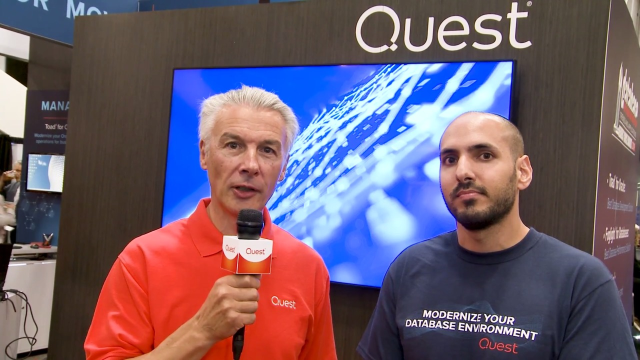Hi, everyone. This is John Pocknell with product marketing at Quest Software. And here we are at Oracle OpenWorld 2019. Really excited to be here. I'm joined today by Pini Debask, who's our product manager for Foglight for databases and our Oracle Ace. So welcome, Pini.
Hi.
So tell me about what you're hearing at Oracle OpenWorld? What sort of customer conversations have you had? What sort of things are you hearing, particularly in the world of monitoring Oracle databases?
I think what we find quite interesting this year is the increasing adoption of open source databases, specifically MySQL. Obviously, since it's Oracle OpenWorld, then MySQL is owned by Oracle. So we see more and more demand for MySQL monitoring.
Many customers have both Oracle and MySQL. And they want a single pane of glass. They want to have one monitoring solution to cover all of their cross-platform databases, whether it's on prem or in the cloud.
Many customers start to ask more about the cloud this year compared to last year. We're still seeing that Oracle Cloud demand or Oracle cloud popularity is pretty low. I see more customers asking about Amazon RDS. But I assume that in the next few years, we'll probably see more and more customers going to the Oracle Cloud because it seems like Oracle is pushing very aggressively to that direction. So we'll see. It's pretty interesting.
So just expand a little bit for us for the benefit of the viewers on what do you mean by a single pane of glass when you're talking about monitoring. What's so special about that? And what are the things that make Foglight unique?
Sure. So the goal is really to provide consistent user experience. So let's say you're a DBA that is responsible for different database platforms-- Oracle, SQL Server, MySQL, MongoDB. You want to make sure that you have the same functionalities and the same look and feel, regardless of the database platform that you monitor.
You want to have cross-platform reporting. You want to run reports for inventory, availability, performance to share with your colleagues, with your manager. And you don't want that they all have different capabilities or different metrics.
You want everything to feel the same thing. And that's why with Foglight, our goal is to provide consistent user experience. One global view, one dashboard that shows everything for all the field databases, whether on premise or in the cloud.
Excellent. OK. So Pini, you had a session this morning I understand, right? And I think you've got another session tomorrow, too. Can you tell us what those sessions are and what they're about and why people should be interested? Obviously, people have attended the morning session already. But your session tomorrow, what are people going to gain from these sessions?
Yeah, the session this noon, I was actually surprised. It was during lunchtime. I expected to see a low attendance. It was actually a full room, 50 people.
The content for today's session was about Oracle database locking mechanism. So, very basic concepts of the core functionality of how Oracle works. And it seems like people are really interested on the basic stuff, right? The basic ways of how Oracle is implemented, how it's working behind the scenes, some best practices.
Obviously, locking is a common issue for performance, common cause for performance issues. So the goal of the session was really to try and expand some best practices. How to maximize concurrent access to the same database or the same tables. And also, how you can monitor all that with Foglight.
Tomorrow's presentation is really more about Oracle Data Guard. We're going to talk about some different modes and options and types for Data Guard. We'll talk about Oracle Data Guard limitations, about Oracle Data Guard monitoring. Some new features that Oracle introduced in 12C and 18c and 19c. So hopefully, it will be pretty interesting for the audience.
Yes, hopefully it will. So finally, Pini, talk to us about Foglight. What's coming next in Foglight? I mean, you're a PM that's always bringing out new stuff in the product, right? What can people expect to see in the coming versions or even the current version of Foglight? Just to keep people up to date. Because people don't always keep up to date with the current version, right? So talk about what's in the current version and what's coming up.
Sure. So first, I would like to share what we just announced recently. Actually, two weeks ago, we announced support for Azure SQL managed instance, as well as SQL Server on Amazon RDS. In other words, now we have a complete coverage for all of the Amazon cloud databases platforms with Foglight.
And also, Azure SQL managed instance. Azure SQL managed instance is a relatively new offering with Azure. And now, we fully support that, which is very exciting for our customer base. We're seeing a very high demand for this cloud database.
And in terms of FraudNet, we have a very exciting roadmap. This year, we're going to add support for additional database platforms, SAP HANA and Amazon Redshift. So to summarize, very exciting roadmap, very rich roadmap. And hopefully, we'll see our customers leveraging those features and proactively monitoring their cross-platform database environments with Foglight.
Great. Well, thanks very much, Pini, for taking the time to speak to us. So there you have it, direct from the horse's mouth-- expert and Oracle Ace, Pini Debask. So if you want more information on how our monitoring solutions can help you monitor your database environment, go to our website, press.com, to learn more. Thank you very much for listening.
 05:32
05:32
